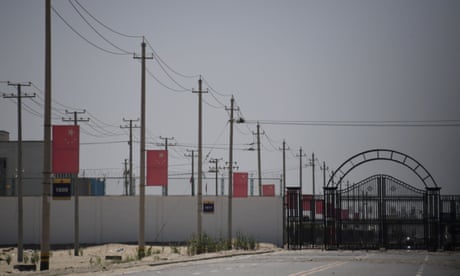https://www.theguardian.com/world/2021/mar/04/chinas-communist-party-ran-campaign-to-discredit-bbc-thinktank-finds
https://twitter.com/SariArhoHavren/status/1368458369049255936
Sari Arho Havrén
@SariArhoHavren
·
"because it believes domestic control to be fundamental to its political power & legitimacy, and because controlling global narratives around key public issues is fundamental to the pursuit of its foreign policy interests."
@SariArhoHavren
·
"because it believes domestic control to be fundamental to its political power & legitimacy, and because controlling global narratives around key public issues is fundamental to the pursuit of its foreign policy interests."
China's Communist party ran campaign to discredit BBC, thinktank finds
Australian study finds a 'coordinated effort by CCP's propaganda apparatus' to distract from critical BBC reports and redirect narrative
Australian study finds a 'coordinated effort by CCP's propaganda apparatus' to distract from critical BBC reports and redirect narrative
theguardian.com
China's Communist party orchestrated an international campaign to undermine the BBC and discredit its reporting during the first two months of the year, using western social media networks, an Australian thinktank has found.
Attacks intensified in response to high-profile BBC reports, including an investigation into systemic rape in internment camps in Xinjiang that was broadcast in early February, the Australian Strategic Policy Institute said, in its report, "Trigger Warning".
It describes a "coordinated effort by the CCP's propaganda apparatus … to discredit the BBC, distract international attention and recapture control of the narrative," mostly outside Chinese borders.
Researchers tracked posts on Facebook, Twitter and YouTube – platforms that are blocked in mainland China – that were uploaded by diplomatic and state media accounts, and pro-Beijing influencers, and then amplified by troll networks.
It described three main approaches that were repeatedly deployed to try to undermine critical reporting from the UK's public broadcaster.
The posts claimed that the BBC was biased and spreads disinformation, alleged that domestic audiences in the UK don't trust its reporting, and said that its coverage of China is instigated by spy agencies or foreigners hostile to Beijing.
"The coordinated approach to counter and undermine the BBC highlights several features of the CCP's increasingly agile propaganda and disinformation apparatus," the report found.
The posts included several which amplified and promoted British and other western critics of the BBC, attempting to deepen and expand existing divisions.
"The CCP's influence apparatus increasingly exploits both pre-existing narratives and content that it sources from Chinese and western social media and fringe websites, knowing that some of those narratives already have degrees of recognition and resonance that will engage audiences," the report said.
The analysis was intended as a "snapshot" of coordinated attacks rather than a comprehensive survey, but on Twitter alone researchers logged more than 250 mentions of the BBC by nearly 50 diplomatic and state media between the start of the year and 17 February.
Although the techniques were not new, the intensity of the campaigns, and combination of actors involved is increasing, ASPI found.
Posts reached wider audiences through "the mobilisation of a pro-CCP Twitter network that has previously amplified the Covid-19 disinformation content being pushed by China's ministry of foreign affairs," the report said. "Negative online engagement with the BBC peaks on the same days as that of the party-state's diplomats and state media."
The increasing aggression and sophistication of China's international information campaigns have been thrown into focus by the pandemic, as Chinese officials have shared and promoted conspiracy theories about the origins, and sought to discredit investigations into its early spread.
Australia's foreign minister has accused China of spreading disinformation that "contributes to a climate of fear and division", while the European Union faced allegations that a report about Chinese disinformation over Covid-19 was watered down in response to pressure from Beijing.
Another peak in activity came when Chinese state broadcaster CGTN lost its broadcast licence in the UK, after regulator Ofcom concluded that the news network was ultimately controlled by the Chinese Communist party.
A week after Beijing threatened to retaliate for that decision, BBC World News was being banned from airing in China. The attacks on the BBC are part of a pattern of information warfare that Beijing is likely to continue, ASPI warned.
"To contest and blunt criticism the party will continue to aggressively deploy its propaganda and disinformation apparatus," the report said.
"This is because it believes domestic control to be fundamental to its political power and legitimacy, and because controlling global narratives around key public issues is fundamental to the pursuit of its foreign policy interests."
... as you join us today from Japan, we have a small favour to ask. Through these turbulent and challenging times, millions rely on the Guardian for independent journalism that stands for truth and integrity. Readers chose to support us financially more than 1.5 million times in 2020, joining existing supporters in 180 countries.
For 2021, we commit to another year of high-impact reporting that can counter misinformation and offer an authoritative, trustworthy source of news for everyone. With no shareholders or billionaire owner, we set our own agenda and provide truth-seeking journalism that's free from commercial and political influence. When it's never mattered more, we can investigate and challenge without fear or favour.
Unlike many others, we have maintained our choice: to keep Guardian journalism open for all readers, regardless of where they live or what they can afford to pay. We do this because we believe in information equality, where everyone deserves to read accurate news and thoughtful analysis. Greater numbers of people are staying well-informed on world events, and being inspired to take meaningful action.
In the last year alone, we offered readers a comprehensive, international perspective on critical events – from the Black Lives Matter protests, to the US presidential election, Brexit, and the ongoing pandemic. We enhanced our reputation for urgent, powerful reporting on the climate emergency, and made the decision to reject advertising from fossil fuel companies, divest from the oil and gas industries, and set a course to achieve net zero emissions by 2030.



No comments:
Post a Comment